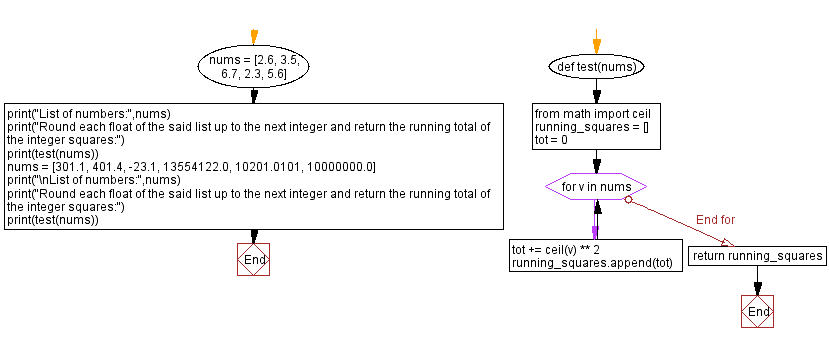Python: Round each float in a list of numbers up to the next integer and return the running total of the integer squares
Python Programming Puzzles: Exercise-80 with Solution
Write a Python program to round each float in a given list of number up to the next integer and return the running total of the integer squares.
Input: [2.6, 3.5, 6.7, 2.3, 5.6] Output: [9, 25, 74, 83, 119] Input: [301.1, 401.4, -23.1, 13554122.0, 10201.0101, 10000000.0] Output: [91204, 252808, 253337, 183714223444221, 183714327525025, 283714327525025]
Pictorial Presentation:

Sample Solution:
Python Code:
#License: https://bit.ly/3oLErEI
def test(nums):
from math import ceil
running_squares = []
tot = 0
for v in nums:
tot += ceil(v) ** 2
running_squares.append(tot)
return running_squares
nums = [2.6, 3.5, 6.7, 2.3, 5.6]
print("List of numbers:",nums)
print("Round each float of the said list up to the next integer and return the running total of the integer squares:")
print(test(nums))
nums = [301.1, 401.4, -23.1, 13554122.0, 10201.0101, 10000000.0]
print("\nList of numbers:",nums)
print("Round each float of the said list up to the next integer and return the running total of the integer squares:")
print(test(nums))
Sample Output:
List of numbers: [2.6, 3.5, 6.7, 2.3, 5.6] Round each float of the said list up to the next integer and return the running total of the integer squares: [9, 25, 74, 83, 119] List of numbers: [301.1, 401.4, -23.1, 13554122.0, 10201.0101, 10000000.0] Round each float of the said list up to the next integer and return the running total of the integer squares: [91204, 252808, 253337, 183714223444221, 183714327525025, 283714327525025]
Flowchart:

Visualize Python code execution:
The following tool visualize what the computer is doing step-by-step as it executes the said program:
Python Code Editor :
Have another way to solve this solution? Contribute your code (and comments) through Disqus.
Previous: Find the largest negative and smallest positive numbers.
Next: Calculate the average of the numbers a through b rounded to nearest integer, in binary.
What is the difficulty level of this exercise?
Test your Programming skills with w3resource's quiz.
Python: Tips of the Day
Find current directory and file's directory:
To get the full path to the directory a Python file is contained in, write this in that file:
import os dir_path = os.path.dirname(os.path.realpath(__file__))
(Note that the incantation above won't work if you've already used os.chdir() to change your current working directory, since the value of the __file__ constant is relative to the current working directory and is not changed by an os.chdir() call.)
To get the current working directory use
import os cwd = os.getcwd()
Documentation references for the modules, constants and functions used above:
- The os and os.path modules.
- The __file__ constant
- os.path.realpath(path) (returns "the canonical path of the specified filename, eliminating any symbolic links encountered in the path")
- os.path.dirname(path) (returns "the directory name of pathname path")
- os.getcwd() (returns "a string representing the current working directory")
- os.chdir(path) ("change the current working directory to path")
Ref: https://bit.ly/3fy0R6m
- New Content published on w3resource:
- HTML-CSS Practical: Exercises, Practice, Solution
- Java Regular Expression: Exercises, Practice, Solution
- Scala Programming Exercises, Practice, Solution
- Python Itertools exercises
- Python Numpy exercises
- Python GeoPy Package exercises
- Python Pandas exercises
- Python nltk exercises
- Python BeautifulSoup exercises
- Form Template
- Composer - PHP Package Manager
- PHPUnit - PHP Testing
- Laravel - PHP Framework
- Angular - JavaScript Framework
- Vue - JavaScript Framework
- Jest - JavaScript Testing Framework
